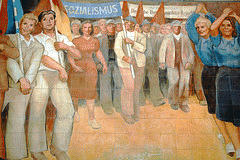Socialism is better than capitalism. So say 20 percent of Americans, and another 27 percent say they can't say which is better, according to an April 9 Rasmussen poll.
There's hope.
from flickr.com by Mr G's Travels
When you consider that virtually no newspaper, broadcaster, well-funded think tank, teacher, or anybody's boss or commander ever said something nice about socialism, it's remarkable that only 53 percent of us still favor rule by the moneyed class. Perhaps folks are learning how capitalism sacrifices happiness for individual gain.
As Billy Bragg exhorts us in his update of the socialist anthem "The Internationale": "Stand up, all victims of oppression/for tyrants fear your might/Don't cling so hard to your possessions/For you have nothing if you have no rights."
No less a "capitalist tool" than Forbes Magazine let a red cat out of the bag with a report this month that the happiest countries tend to be Scandinavian socialist democracies. High per-capita GDP certainly plays a role in their felicity, but even social democratic New Zealand, with per-capita GDP only 64 percent of the United States', ranks with the 10 democracies above us in the happiness index. They pay high taxes in these pinkotopias, but folks enjoy entitlements like free college, extensive elder care, and 52-week paid maternity leave.
The 2005 poll measured personal reports of enjoyment, pride in achievement and learning, being respected, among other things. Forbes suggests that such happiness derives from family, social and community networks, and a decent work-life balance, noting that the average workweek in Scandinavia is 37 hours.
Nice dream, but how do we get there? Most of these countries dumped capitalist exploitation long ago and instituted mixed economies with socialist ideals. More contemporary models are the 11 Latin America countries pursuing "Socialism in the 21st Century." They too reject top-down Leninism for a system based on participatory democracy and solidarity.
In Ecuador, a land I have studied and worked in, a broad coalition of indigenous, environmentalists, trade unions, professional organizations, feminists, gay activists, left parties, and students laid the groundwork for transformation. They just re-elected Rafael Correa, their leftist standard-bearer, as president. They fought racism, oligarchs, oil companies, and corrupt politicians for decades.
The economies of Latin America's red eleven are improving, although none of them has instituted a socialist utopia. They are still subject to the slings and arrows of egotism, error, and internecine conflict. But they have overcome the greatest impediments to their advancement, including the U.S.-based bankers who are draining our treasury now. And the civil society they created in the struggle is the guarantor of their democracy.
Before finding the path of progress, many of these countries had lurched from violent paroxysm to confusion and resignation, not unlike what the U.S. currently endures.
For example, our Auto Industry Task Force just bankrupted GM and Chrysler, fired tens of thousands of employees, extorted immense sacrifices from active and retired autoworkers, and is dominated by the investment bankers who absorbed trillions in national wealth to keep themselves rich after destroying the economy.
Instead of seizing plants as our Canadian comrades are doing, or adding "bossnapping" to plant occupations as the French have done, we shake our heads as the union negotiates the terms of surrender.
What could we do with socialism? Well, take banks for starters: take them, so instead of private scams that go broke gambling with money they don't own, they'd become public utilities that finance production, infrastructure, and homes. And treat aging industries like autos: instead of dumping, we'd transform them according to a national plan for green jobs and a healthy environment.
Solidarity is the path as well as the destination of socialism. Solidarity grieves when a worker loses his job or sees her pension slashed. Solidarity cheers when a union wins middle-class pay. Solidarity rejects the greed of insurers as the distributor of healthcare and demands single payer for all.
(Note: You can view every article as one long page if you sign up as an Advocate Member, or higher).





